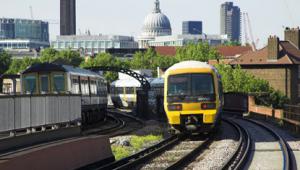Under the system for deciding increases, regulated fares including season fares on most commuter journeys, are uprated using the retail prices index measure of inflation for July. This stood at 1.9%, up 0.3 percentage points from June.
Responding to the change, Labour’s shadow transport secretary Andy McDonald said rail passengers in Britain already paid the highest fares in Europe and received overcrowded carriages and unreliable services.
The party’s policy of bringing all rail franchises back into public ownership when they expire was the best way to secure a fair deal for rail passengers and taxpayers, he said.
“Passengers are told that higher fares are necessary to fund investment, but vital projects have been delayed by years and essential maintenance works have been put on hold,” he said.
“Money that could be used to keep fares down or reinvested to improve our services is instead subsidising the profits of private companies and other nation’s railway systems – it’s a scandal.
The Campaign for Better Transport reiterated its call for the government to switch from using the RPI measure of inflation – which is no longer designated as a National Statistic – to the consumer prices index figure used for pensions and most benefits.
If this measure was used, the increase would have been just 0.6%, chief executive Stephen Joseph highlighted.
“Using the consumer price index to set rail fare increases would have little impact on railway revenues, but it would save passengers money and bring fares into line with things like public sector pensions,” he said.
However, rail minister Paul Maynard said wages are growing faster than train ticket prices, The decision to cap regulated rail fares in line with inflation, compared to a previous system of RPI+1%, would save season ticket holders £425 on average in the five years to 2020, he said.
Paul Plummer, chief executive at the Rail Delivery Group, which represents train operators and Network Rail, said: “Nobody wants to pay more to travel to work and at the moment in some areas people aren't getting the service they are paying for, and we know how frustrating that is. But increases to season tickets are set by government. For every pound paid in fares, 97p goes back into running and improving services and it’s our job to make sure that money is spent well.
"We need to sustain investment to build a modern railway, and money from fares helps us to do this, which is crucial with rail now more important to our nation’s prosperity than at any time since the Victorian era. In many places our railway is full, with passenger numbers having doubled in two decades, and we know passengers and the country need better services.”




















